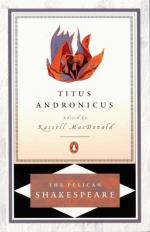|
This section contains 4,846 words (approx. 17 pages at 300 words per page) |

|
SOURCE: "'Tragedy, Laugh On': Comic Violence in Titus Andronicus," in Renaissance Drama, n.s. Vol. x, 1979, pp. 71-91.
In the following excerpt, Brucher suggests that much of the violence in Titus Andronicus is darkly comical in nature and serves to expose unpleasant truths about human nature and the limits of social codes of conduct.
Despite Thomas Heywood's contention [in An Apology For Actors, 1612] that tragedy depicts "the fatal and abortive ends of such as commit notorious murders, … aggravated and acted with all the art that may be, to terrify men from the like abhorred practices," the effect of Elizabethan stage violence may not be moral at all. Nahum Tate did not think so, because he was determined to "improve" King Lear. By concluding his adaptation (1681) "in a success to the innocent distressed persons," Tate made the ending more "just" and avoided encumbering "the stage with dead bodies, which...
|
This section contains 4,846 words (approx. 17 pages at 300 words per page) |

|


